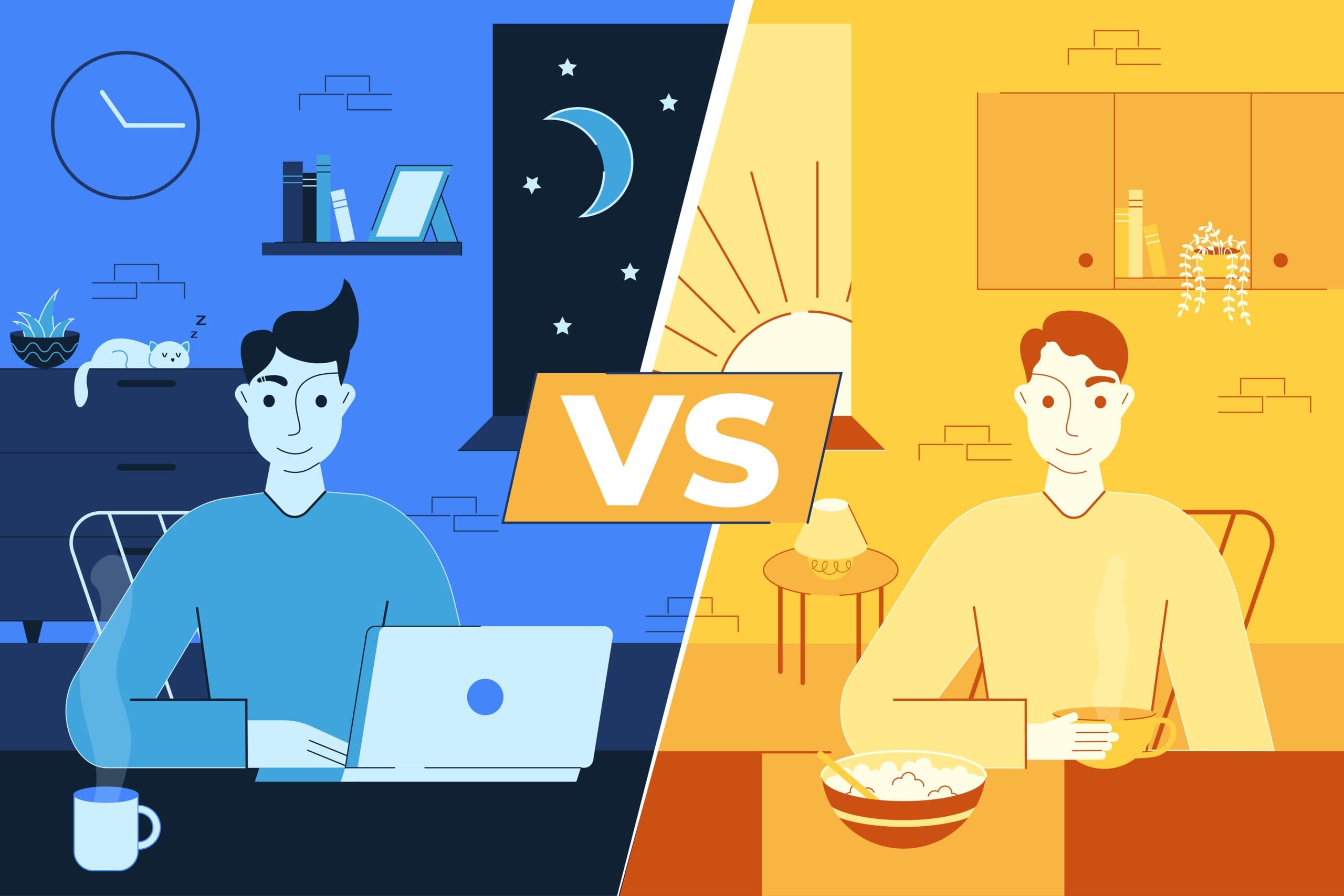Have you ever heard of sleep chronotypes before? Well, if not, then you’re probably at least familiar with the idea of early birds and night owls; the kinds of people who become more active first thing in the morning or late at night.
However, as it turns out, birds/owls are just one form of sleep chronotype, and there are several more variations out there that people fall into. But although the words sound fancy, sleep chronotypes actually boil down to something relatively simple: whether or not our body’s natural tendency is to feel more alert earlier in the day versus later in the evening.
Of course, that’s not to say that your sleep chronotype only affects the quality of shuteye you receive. It can also impact performance and activity, not to mention health and happiness.
So, if you suffer from poor quality sleep, low energy levels, and off-moods more often than you’d like, and are struggling to understand why, you might want to ask, ‘What is my sleep chronotype?’ to help you find out.

The science behind sleep chronotypes
According to various pieces of research, your sleep chronotype tends to be influenced by a variety of factors, such as genetics and your circadian rhythm, but rather than being a distinct and separate element, think of sleep chronotypes as being on a spectrum or sliding scale.
Naturally, being linked with your circadian rhythm, your sleep chronotype is going to play a role in when you wake up and how early you want to go to bed, while also influencing when you prefer to exercise, your appetite, and even your core body temperature fluctuations.
However, the reason for such huge variations in sleep chronotypes isn’t fully understood, though there are theories out there that suggest it might have something to do with hunter-gatherers evolving to have greater chances of survival.
After all, predators are much less likely to be able to feast on snoozing humans if they’re protected by others who are wide awake.
What is my sleep chronotype?
Now that you have some idea of what sleep chronotypes are, you’re probably curious to know what your personal sleep chronotype is. Well, unfortunately, there isn’t an unequivocal, set-in-stone way to determine your sleep chronotype.
With that being said, some experts have at least tried categorising chronotypes by specific wake and sleep times, while others adopt a more all-encompassing approach, taking into account things like mealtimes and exercise preferences, too.
And yet, there are so many nuances and variations, so many genetic, biological and environmental factors affecting sleep that it’s probably a bit unrealistic to expect absolutes when it comes to determining your sleep chronotype.
However, being more aware of when you feel most at ease in terms of physical, mental and emotional regulation can be a good way of better understanding your body’s natural preferences. And in doing so, you’ll be in a stronger position to make beneficial lifestyle changes that will help you achieve a greater sense of overall wellness.
So, with this in mind, here’s a quick rundown of the main sleep chronotypes:
1. Lion
Making the most of early mornings is a must for lion chronotypes – give them a 6am start and they’ll be purring like a kitty cat in no time. Lions are at their most productive from around 9am, but by 2pm, they become much less agreeable. And, naturally, the earlier a lion turns in for bed the better they’re going to feel when the sun rises the next day.
2. Bear
Studies into sleep chronotypes suggest that bears make up around 55 per cent of the population and are able to happily maintain traditional office hours, as well as a social life later into the evening. They rise around 7am and are at their most productive from 10 am to 2pm, with bedtime usually being around 11pm.
3. Wolf
Wolf chronotypes are what we usually call night owls. They sleep until around 8am and tend to be at their most productive in the afternoons and evenings. Wolves will stay up partying until midnight if you let them. Said to be creative thinkers, wolf chronotypes are thought to make up an estimated 15-20 per cent of the population.
4. Dolphin
This chronotype is named after a creature that’s famous for remaining alert while sleeping. Dolphin chronotypes tend to have irregular or fragmented sleep patterns, perhaps even going so far as insomnia. They might wake up early, but still go to bed late, while their peak productivity times can vary.

Can you change your sleep chronotype?
As much as it annoys sleep scientists, much of our biology is beyond our conscious control, meaning it can be tricky to permanently change the way our sleep and circadian rhythms operate.
Yet by adapting certain aspects of our lives and jobs (or at least as much as is realistically practicable) we can better harness the power of our natural tendencies towards morning and nighttime alertness, rather than fight against them.
For example, if you’re massively alert at 6am but flagging by lunchtime, can you rearrange your morning commitments and routine to capitalise on your lion-esque early bird energy while downplaying any negative effects associated with your afternoon lull?
By contrast, if you’re moody before 9am, but are always the life and soul of the party into the small hours of the night, can you tweak the order of your day to offset any imbalances and accommodate these natural ebbs and flows?
Things like getting into good habits at bedtime can also help to channel effective sleep routines and work wonders when it comes to feeling more alert and being more productive throughout the day – not to mention helping you to achieve better quality sleep overall.

Understanding the way you sleep
In order to get a better night's sleep, you must first understand the things that are hindering you from doing so. It's not just your mattress that stops you from getting the rest you need, but things like understanding how much deep sleep you need, or even just knowing the different sleep cycles, can help you uncover areas for improvement.
You can learn all about how sleep works in the Sleep Science section of our blog, while you can also discover how to enhance your sleep in our Health & Lifestyle section, which is full of helpful tips and tricks for a better night's sleep.




